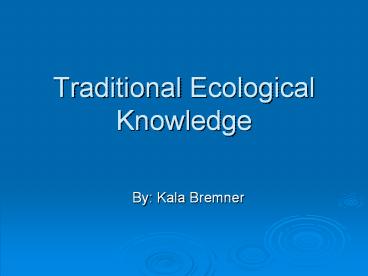Traditional Ecological Knowledge - PowerPoint PPT Presentation
1 / 16
Title:
Traditional Ecological Knowledge
Description:
Traditional Ecological Knowledge By: Kala Bremner Outline What is TEK and what are the risks 2 types of knowledge What does TEK do TEK and the global community TEK in ... – PowerPoint PPT presentation
Number of Views:313
Avg rating:3.0/5.0
Title: Traditional Ecological Knowledge
1
Traditional Ecological Knowledge
- By Kala Bremner
2
Outline
- What is TEK and what are the risks
- 2 types of knowledge
- What does TEK do
- TEK and the global community
- TEK in Nanaimo area
- Categories of TEK
- Problems facing TEK and Scientific Knowledge
- Co-management
- Conclusion
3
What is TEK
- Traditional Ecological Knowledge refers to
- the body of knowledge amassed over generations
by Indigenous people with respect to their
environment, and can be both spiritual and
ecological in nature - (Doubleday, 1993).
4
TEK
- Transmitted orally over generations through
songs, stories and other forms. - Oral traditions are at risk of being lost if
native language is no longer used or culture is
disrupted through governments policies both past
and present. - Often encompasses spiritual events.
- Recent introduction of western
- religions often hinder the
- ability for a group of people
- to practice their traditions as
- seen as uncivilized.
5
Types of place specific Knowledge
- Local knowledge
- doesnt have to have any historical
- component.
- Refers to any learnt knowledge of a place be it
location based knowledge or non-traditional
knowledge. - Relevant to a specific time and place.
- Indigenous knowledge
- Knowledge that is culturally specific or passed
on by Indigenous peoples over generations. - Unique to a specific society and culture.
- Takes into account learnt behaviors with respect
to the environment.
6
What does TEK do?
- Continuously tested
- Based on practices that have been in place over
hundreds even thousands of years in some cases. - Allows people to have a close connection with the
natural environment. - Teaches children and young people environmentally
friendly practices. - Works to use the environment and its resources
in a sustainable manor. - Focuses on the knowledge of elders and the
importance of them in a society.
7
The introduction of TEK globally
- 1987- The Brundland report published by The
United Nations World Commissions on Environment
and Development. - 1992- Earth Summit in Rio de Janeiro
- 1996 Canada contributed the Aboriginal
Forest-based Ecological Knowledge in Canada. - (Natural Resource Canada, 1997)
8
TEK on Vancouver Island
- Ecotrust Canada
- Georgia Basin Action Plan
- Nanaimo Bird Alert
- Gengenlilas preschool in Campbell River
9
Current problems facing TEK
- Risk of being lost as less importance is given to
indigenous peoples knowledge. - Loss of traditional language often associated
with loss of culture and traditional practices. - Western ideas often hinder traditional knowledge.
- Economic incentives and western ideals have the
ability to influence indigenous groups. - Introduction and expansion of Western way of life
often equals a loss of traditional ways of life.
10
Scientific Knowledge and TEK
- TEK is a system of knowledge, parallel and
complementary to "Western scientific knowledge,"
which can be organized into three categories,
each of which has its Western scientific
equivalent (Environment, 1996). - 3 categories
- Systematics- in-depth classification systems.
- Use and development of new technologies for
activities such as hunting and fishing. - Understanding the ecology of plants and animals
in a intricate web of life.
11
Problems with Scientific Knowledge
- Doesnt take into account indigenous knowledge
- Can appear to be moral free
- Is purely based on scientific knowledge
- Often appears to put economical progress above
environmental values - Can create an unstable economy based on resource
extraction instead of incorporating resource
management strategies
12
Co-management
- Set up to integrate aspects of both indigenous
knowledge (TEK) and state level governments - State level governments traditionally use
information attained by the - scientific community
- Indigenous knowledge is
- that passed on
- through generations.
- Co-management works to
- incorporate both groups
- together
- Incorporates anything from
- resource management to
- world views and religious
- practices
13
Conclusion
- TEK is knowledge that aboriginal people have
accumulated over generations due to having a
close and intimate relationship with the earth,
including seasonal cycles, animals and natural
phenomenon's. - Incorporating co-management programs in Natural
Resource management is important as both groups
bring important and relevant aspects into the
equation.
14
References
- Doubleday, Nancy
- 1993 Finding Common Ground Natural Law and
Collective Wisdom, - in J.T. Inglis (Editor) Traditional Ecological
Knowledge Concepts - and Cases. Ottawa, Ontario Canadian Museum of
Nature . - Environment Cananda
- 1996, The state of Canadas Environment
retrieved March 15th, 2008, - from http//www.ec.gc.ca/soer-ree/English/SOER/1
996report/Doc/1-6-9-5-6-1.cfm - Johnson, Martha.
- 1992, LORE Capturing Traditional Environmental
Knowledge. Ottawa, Ont Dene cultural institute
and the international Development Research
Centre. - Natural Resources Canada
- 1997, Traditional Ecological Knowledge of
Aboriginal Peoples, Retrieved March 13th, 2008,
from http//canadaforests.nrcan.gc.ca/articletopic
/96 - Tsuji, L, J,K,.
- 1996, Loss of Cree traditional Ecological
knowledge in the Western James Bay regions of
Northern Ontario, Canada A case study of the
Sharp- tailed grouse. North York, Ontario York
University. Retrieved March 15, 2008 from
www.brandonu.ca/Library/cjns/16.2/tsuji.pdf
15
Hidden answer to the amazingly fun crossword
- In my opinion, preserving traditional ecological
knowledge for future generations to come is
important.
16
Questions?































